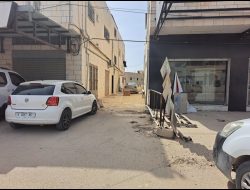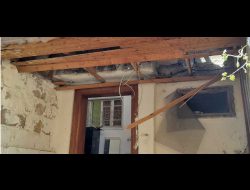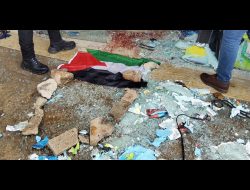On 23 July 2017, soldiers shot N.R., 13, after he went through an opening in the Separation Barrier near Jayus. He was hospitalized in Israel for a month and underwent three operations. For the first eight days, soldiers guarding his room prevented his parents from staying with their son and briefly tied him to the bed. His parents were not present when he was interrogated and when his detention was extended. This grave conduct of the security forces is far from unusual, reflecting both declared policy and norms that have developed.
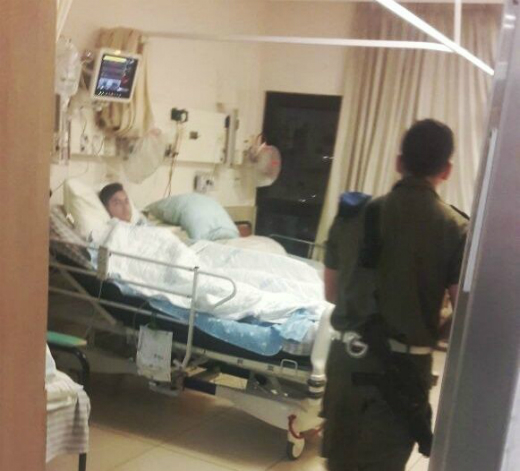
N.R. being guarded by a soldier at hospital. Photo taken by his mother on her mobile phone, as she sat outside and was not allowed into the room.
On 23 July 2017, at about 5:00 P.M., two 13-year-old Palestinian youths from the town of Jayus, in the northern West Bank, crossed through an opening in the Separation Barrier west of the town. Soldiers hiding in wait on the other side of the barrier fired at one of the youths, N.R., injuring him in both legs. His friend fled the scene. According to media reports, a military source stated that the injured youth “had torn the fence and set a tire on fire.”
The youth’s father, S.R., 43, who is a work manager at a construction site, came home from work at approximately 5:30 P.M. and saw some seven soldiers gathered by the fence. In a testimony he gave to B'Tselem field researcher Abdulkarim Sadi on 25 July 2017, he stated:
I went over to some residents who had gathered by the fence. On the way, someone told me that my son had been injured. I saw him lying on the ground, with soldiers surrounding him. There were several military jeeps and a military ambulance there. I tried to get close but the soldiers wouldn’t let me through. I managed to get up to about five meters away from him, and then a soldier warned me that he would shoot if I came any closer. He signaled clearly to the other soldiers to shoot me in the head if I got any closer. I felt that the threat was serious. I was scared and stopped.
I was very worried about my son. I asked the soldier, in Hebrew, how he was doing. The soldier said that he was fine, that military physicians were treating him and that he wasn’t in danger. I asked him to let me take my son to get medical treatment, but he said: “We shot and injured him, so we’ll take care of him.”
About an hour later, the soldiers transferred N.R. to a military ambulance that took him away.
S.R. and his wife ‘A., 44, who had also arrived on the scene, returned home. A short while later, the head of the Jayus Council informed S.R. that his son had been admitted to Meir Hospital in Kfar Saba and that his wife could receive a permit to enter Israel, but that S.R. himself could not “for security reasons.” ‘A.R. traveled to Meir Hospital that evening.
In a testimony she gave to B’Tselem field researcher Abdulkarim Sadi on 17 August 2017, she recalled:
I got to the hospital at about 9:30 at night. At first, I couldn’t find my son. I went over to a staff member to ask where he was, and he told me that my son was undergoing surgery. When I heard that, I got anxious and started to cry. I began praying to God to cure my son.
I sat in the lobby until 4:00 A.M., until I saw doctors, nurses and two soldiers pushing a bed with my son lying on it, unconscious. I immediately got up and followed them, to see how he was doing. I managed to follow them into the Intensive Care Unit. One of the doctors comforted me. I stood by my son’s bed for a few minutes. He was still unconscious. Then the doctors asked me to leave the ICU. They said they’d let me come back in and check on him once he woke up.
I left the room with tears in my eyes, after seeing my son lying on a hospital bed. I sat outside the ICU for about an hour. Then I went back inside, after my son woke up from the anesthesia. I saw that he was okay and calmed down. There were two soldiers stationed in the room, guarding him. The doctors protested about the soldiers being inside an ICU room, but the soldiers stayed. They came up to me and ordered me to leave the room. They didn’t let me stay by my son’s side. More soldiers and police officers came and carried me out forcefully. Before they dragged me out, I saw them tie my son’s hands together with metal handcuffs and lay them on his stomach.
I waited outside and a police officer came over and told me that my entry permit had expired and that I had to leave the hospital. An Israeli peace activist who had been at the hospital since morning drove me to the entrance to Qalqiliya, and from there I continued to my village, Jayus.
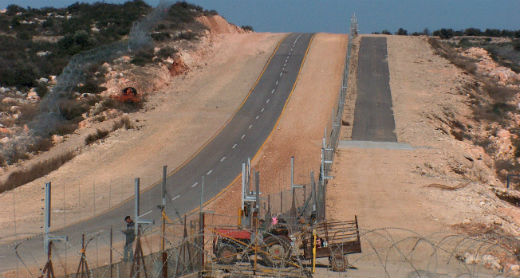
Construction of the Separation Barrier near Jayus, cutting the village off from most of its farmland. Photo by Oren Yakobovich, B'Tselem, January 2006.
In a testimony that the youth, N.R., gave to B’Tselem field researcher Abdulkarim Sadi on 22 August 2017, he stated:
While I was lying in bed at the hospital, the soldiers tied my arms and legs with metal handcuffs, even though my legs were swollen and red. They tied me to the bed with the handcuffs. I lay like that for an hour until I managed to ring the bell to get the nurses and doctors. They came straight away. I don’t understand Hebrew, but from the way they were arguing with the soldiers, I realized that they were protesting about their tying my hands and legs. The soldiers removed the handcuffs.
On 24 July 2017, a hearing was held at Salem Juvenile Military Court to extend N.R.’s detention, without him or his parents present. In the hearing, the prosecution stated that N.R. was suspected of arson and rioting, and asked to extend his detention by four days to enable interrogation. The judge approved the prosecution’s request and N.R.’s detention was extended through 27 July 2017.
The next day, N.R.’s mother received a new entry permit for two days and returned to the hospital. When she arrived, she found her son in a different room, still under guard. The two soldiers who were guarding N.R. refused to allow her to enter the room.
In her testimony ‘A.R. stated:
I couldn’t stop crying and was sad to be just a few meters from my son’s bed without being able touch him or kiss him, because the soldiers wouldn’t let me. I tried to cheer him up and kept telling him that I was right there, just outside the door, and that he shouldn’t be afraid because I wasn’t going anywhere and would stay with him. I sat by the door for two whole days, from early morning to late at night, but they didn’t let me go in to him. Every time I tried to enter the room, the soldiers blocked the way and threatened to close the door so that I wouldn’t even be able to see him.
On 26 July 2017, S.R. submitted another application for a permit to enter Israel, as well as an application to extend his wife’s permit, while she was still at the hospital. This time, both applications were approved and the couple received a permit to be in Israel until 1 August 2017. The same day, S.R. joined his wife at the hospital, but the soldiers would not let him enter his son’s room. Several doctors tried to persuade the soldiers to let the parents in, and after a short exchange they were allowed to enter the room for less than a minute. S.R. stated in his testimony:
As soon as I went in, I kissed my son. He was lying in bed. I couldn’t really talk to him because we were all very emotional, but at least I could make sure that he was alive. That was also the first time that they let my wife get close to him and hug him. After half a minute, the soldiers made us leave the room. My wife and I continued to sit and stand by the room for several days, until 31 July 2017. That whole time, the soldiers didn’t let us enter the room even once.
On 27 July 2017, an attorney came to see N.R. and told him that he had been sent by a human rights organization to represent him. The attorney updated the youth on the hearing in his case and told him that a police interrogator would come to see him later that day. When the interrogator came, he took N.R.’s statement about the incident, accused him of lying, and promised him money and a smartphone if he disclosed the names of children who had repeatedly thrown stones and Molotov cocktails at soldiers in Jayus and by the Separation Barrier. N.R. refused. After obtaining N.R.’s signature on his statement, written in Hebrew – a language that N.R. does not understand – the interrogator left the room.
Later that day, another hearing was held in N.R.’s case, without him or his parents present. The judge ordered that the youth be released from detention, subject to payment of bail in the sum of NIS 4,000 (~1,135 USD) and the signing of an unpaid guarantee in the sum of NIS 5,000 (~1,420 USD). On 31 July 2017, S.R. paid bail and signed the guarantee as required. The soldiers then left N.R.’s room and his parents were allowed to be with him. The boy was treated at Meir Hospital for another three weeks, during which time his parents continued to visit him.
On 20 August 2017, after N.R. had undergone two further operations on his legs, the hospital informed his father that the military refused to pay for further treatment and therefore the youth was to be discharged. The hospital director added that if S.R. wanted his son to remain in hospital, he would have to make a down payment of NIS 10,000 (~2,840 USD) and undertake to cover all future treatment costs. N.R. was due to undergo plastic surgery at the hospital a few days later, and his father asked to postpone his discharge by one day so that he could try to secure the money. The hospital management refused to allow this.
That day, at about 3:30 P.M., N.R. was discharged and transferred in a Palestinian ambulance to a hospital in Qalqiliya. On 31 August 2017, he was sent home. Plastic surgery was scheduled at Meir Hospital for 23 September 2017, after it emerged that the Palestinian Authority would cover the cost that the military refused to pay.
B'Tselem’s investigation found that the soldiers shot N.R., a 13-year-old, at close range and from an ambush without any justification. The military then proceeded to prevent his parents from sitting by his bed for eight days, leaving him alone in the company of soldiers who attempted to handcuff him with his parents on the other side of the door. The parents were not allowed to enter the room even when N.R. was being interrogated by the police, and he was questioned without their presence. The soldiers only permitted the youth’s parents to approach him twice, for very brief moments.
The military’s extremely grave conduct in this case is, shockingly, far from unusual. B'Tselem has repeatedly documented the military’s practice of staging armed ambushes, ostensibly to prevent stone-throwing or damage to the Separation Barrier. In several cases, such ambushes have led to pointless and unjustified deaths or injuries, as occurred in this case. The military was well aware of the opening in the fence and could have mended it or openly stationed soldiers there to prevent Palestinians from crossing – as it indeed did, a week after N.R. was shot.
The grave conduct of the security forces continued after N.R.’s unnecessary injury. The soldiers on the scene refused to give his parents information about his condition and evacuated him to hospital in Israel without informing them and without allowing them to accompany their son. The injured boy was shackled to his bed as if he were a dangerous criminal. He was interrogated alone and his detention was extended without him or his parents being present. The family was forced to battle an arbitrary and bureaucratic system, and the father was prevented from seeing his son for the first week. Above all, the boy’s parents were prevented from being with their son in his room for the first days of his hospitalization, and were forced to stay several meters away from him. These practices are not new, either.
The behavior of the security forces in this case is part declared policy and part conduct that has come to be seen as acceptable and reasonable. As a result, as in countless cases in the past, no one will be held accountable for this series of wrongdoings, guaranteeing that similar cases will occur in the future, as long as the occupation persists.
